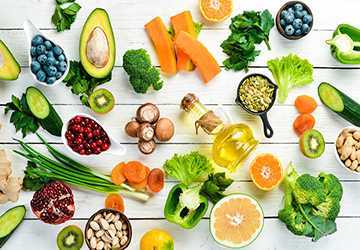4 Pillars of a Balanced Diet to Nourish Your Body and Uplift Your Well-being
Author: William
Have you ever stood before your fridge, wondering what to eat? Or have you looked at a menu, wondering about the best choice for your health? In our busy lives, picking quick and easy foods without thinking if they're good for us is easy.
What we eat affects everything: our energy during the day, how well we sleep, our mood, and even our health in the future. Imagine if every meal you ate made you feel good and was also good for you.
This isn't just a dream. It's possible if we learn about and follow the four main parts of a healthy diet. This article will help you understand these parts and how to make better food choices.
Whether you already care a lot about health or are just starting to think about it, this guide is for you. Let's learn about foods that can make a big difference in our lives.

Unlocking the 4 Pillars of a Wholesome Diet
Before we delve into the specifics, consider this: these pillars aren't just arbitrary food groups. They're the foundation of your well-being, the keystones to a vibrant life. Embrace these, and you're one step closer to your best self.
Macronutrients: Proteins, Fats, and Carbohydrates
Macronutrients are the primary energy sources our body requires. Foods rich in proteins like lean meats, legumes, and dairy help build muscle and repair.
Healthy fats from avocados, nuts, and oils aid cellular functions, while carbohydrates from whole grains and fruits provide quick energy. To harness these nutrients, prioritize whole foods over processed ones.
However, moderation is vital; overconsumption can lead to health issues. Two things to remember here are: choose quality over quantity and ensure a mix of all three for balanced energy.
Micronutrients: Vitamins and Minerals
Micronutrients might sound minor, but they're vital. Found in fruits, vegetables, nuts, and seeds, they support a range of bodily functions. For instance, calcium strengthens bones, while vitamin C boosts immunity.
Aim for a colorful plate—each color signifies different vitamins. But remember to research potential nutrient interactions and avoid over-supplementation.
Lastly, natural food sources are always better than synthetic supplements.
Hydration: The Essence of Life
Water isn't just a thirst-quencher—it's the lifeline for every cell. Besides drinking plain water, hydrating foods like cucumbers, oranges, and watermelons help. Proper hydration aids digestion, nutrient transport, and toxin removal.
While the typical 8-glasses rule is standard, individual needs vary. Always consult your weight and activity levels. Avoid substituting water with sugary drinks; nothing hydrates like pure water.
Fiber and Gut Health
Often overlooked, dietary fiber from grains, fruits, and vegetables aids digestion and keeps you full. It ensures a smooth digestive system and even plays a role in disease prevention.
To boost fiber intake, choose whole grains over refined ones and eat fruits with their skin. However, introducing fiber suddenly can cause discomfort.
Gradually increase intake and drink plenty of water alongside. Remember, a happy gut often means a happier you!

Frequently Asked Questions
Q: Can I substitute water with juices?
Ans: While juices can offer some hydration, they often come with added sugars and calories. Drinking water primarily is essential, as it provides the most direct and efficient hydration without any additives or extra calories.
Q: How can I ensure I get all micronutrients?
Ans: To ensure a rich intake of micronutrients, diversify your diet with various fruits, vegetables, whole grains, and lean proteins. Regularly changing your food sources and choosing colorful plates can help cover a broad spectrum of vitamins and minerals.
Q: Is too much protein harmful?
Ans: Consuming excessive protein can be a concern, especially for your kidneys. It's vital to balance protein intake with your physical activity levels and ensure you're sourcing protein from varied, healthy sources.
Q: Are all fats bad?
Ans: Not! While trans fats and excessive saturated fats aren't ideal, unsaturated fats, like those found in olive oil, nuts, and avocados, are beneficial and essential for various bodily functions.
Q: How much fiber is too much?
Ans: While fiber benefits digestion, excessive amounts can lead to bloating, gas, or discomfort. It's crucial to gradually increase your fiber intake and pair it with ample water to aid digestion.
Conclusion
Choosing the right food might seem tricky, but it gets easier when we focus on the four main parts we discussed. Eating well isn't just a one-time thing; it's a way of living that affects how we feel daily.
Think about it this way: every time we eat, we can do something good for ourselves. As you finish reading this, remember that every small choice matters.
It's okay to take small steps and make changes little by little.
Celebrate your good choices, and don't be too hard on yourself if you slip up. Eating well is a journey, not a race. Let's enjoy the process and see how choosing the right foods can improve our lives in many ways.





